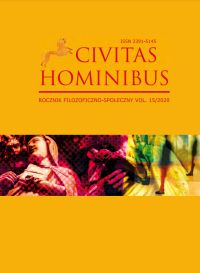15/2020
This article outlines selected causes of the European integration crisis and the potential consequences of the collapse of unification tendencies in Europe. It elucidates the reasons for the contestation of projects that aim to deepen cooperation within the European Union. The consequences of the declining confidence in the liberal paradigm of world politics are discussed, as well as the reasons for the superficial imitation of processes of Europeanization that lead to the reconstruction of the former centre-peripheral divisions. The relationship between democratic deficit within Europe and the decline of the integration regime’s legitimacy are also discussed. The article comments on the possible effects of disintegration tendencies in the area of civil rights, as well as the impact of disintegration on the sense of security in Europe. According to the author, the above phenomena may initiate a split in the Western world and rupture its political unity. This in turn could lead to an era of fear and uncertainty, prior to the creation of a new order on the continent.
Keywords: crisis, the European integration process, liberalism
The dynamic mobility of people in the 21st century is a challenge for the political management of migration flows in Europe. It is crucial to understand the relationship between migration, decision-making, effective management and public opinion. The aim of this article is to present various forms of political management of migration flows in Europe and to evaluate the effectiveness of different policies based on a general analysis of migration and public opinion.
Keywords: migration policy, migration flow management, mobility, control policy, borders, Europe, European Union
The article examines the problems associated with the Europeanization of the Polish Civil Service after Poland’s accession to the European Union. The author demonstrates that, following the accession of Poland to the European Union, Poland’s Civil Service took over many rules and values from the European Union and incorporated them into the domestic legal order.
Keywords: Civil Service, Europeanization, European integration
The rights, obligations and functions of individual state organs in the field of security and defence depend on many conditions. In Poland, many bodies participate in the process of creating, building and shaping national security. The key participants in this process are constitutional organs, which include - the Sejm of the Republic of Poland and the executive organs - the President of the Republic of Poland, the Council of Ministers, the Prime Minister, the minister responsible for national defence and the minister responsible for internal affairs. The author introduces the key competences of the supreme defence management authorities in Poland.
Keywords: defence, President, Council of Ministers, Poland, Constitution
Buildings require huge amounts of energy, which contributes to greenhouse gas emissions. Green building projects aim to reduce the environmental impact of buildings throughout their life cycle, from planning, design, construction, use and disposal. The projects strive to achieve water and energy savings through, for example, the use of smart meters and LED lighting.
A sustainable building is a solution that mitigates climate change. The Energy-efficient construction of new buildings and the renovation of existing ones can reduce energy consumption for space and water heating in buildings by 40-50%. However, if current inefficient building practices persist, buildings could account for 70% of CO2 emissions by 2050.
The United Nations Conference on Sustainable Development in September 2015 confirmed the need for political commitments by the international community in pursuit of sustainable development, in line with the principles of Agenda 21, including common but differentiated responsibilities. The Summit’s outcome document provides guidance for achieving sustainable development as a means of increasing the welfare of present and future generations in all countries - the 17 Sustainable Development Goals. These are based on minimising the types of consumption and production that have negative externalities, while seeking to maximise the types of consumption and production that have positive externalities.
In this broad context, climate and environmental protection must become a global endeavour - the 17 UN Sustainable Development Goals have this aim.
Keywords: Sustainable Development Goals, multi-criteria certification, sustainable construction, ecology
The article deals with the problem of the relationship between an employee and a project manager. The research aims to examine the employee - project manager relationship in the projects of European companies. The article consists of two main parts. The first is theoretical, the second empirical. The empirical data was collected by conducting semi-structured interviews with five project managers and five team employees.
Keywords: project management, relationship, manager, employee.


